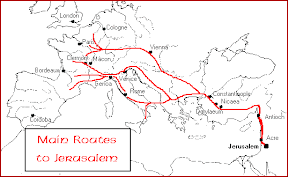The first crusade was lead by Pope Urban II due to the request that was made by Alexius I in 1095. This request was that Alexius himself would receive help from the pope in reclaiming the Holy land in Jerusalem that had been lost decades before. Pope Urban II accepted. They told the crusading soldiers that the land needed to be invaded, and that France was too crowded. Coming from the pope, many soldiers took this to be true. The crusade would be an attack on the Muslims that were living in Jerusalem as they too claimed that it was the Holy land where the Islamic prophet Allah ascended into heaven.
On August 15, 1096 the crusade began.
As a result:
This crusading was much of what had been happening during that era, there were many major religious developments in the West, and also in the East. Many people find the idea of Holy War very controversial.
Pope Urban II's message to the faithful in 1905, in which he summoned them to fight in aid of the eastern Christians, is believed to have been a synthesis of ideas and practices already in existence - holy war, pilgrimage, the indulgence - although it was not fully understood by those who responded to it, many of who were anyway motivated by a desire for material gain. -Smith
By then the traditions had been reinforced by the work of apologist like Pope Innocent II, St Bernard of Clairvaux and, above all, the greatest canonist Gratian, who, drawing on elements already present in crusade propaganda, had demonstrated definitively that the Church, and especially the popes, could authorize holy war on God's behalf.-SmithThe concepts to which Urban gave expression, moreover, were transformed by the dreadful experience of the army on the march and the euphoria that followed the liberation of Jerusalem into a new association of ideas, crude and semi-popular, which found its way into the narrative accounts of eyewitnesses. This was refined by the next generation of writers, especially by three French monks, Robert the Monk, Guibert of Nogent and Baldric of Bourgueil, who represented it to the clerical public relatively sophisticated and theologically acceptable terms. They put the miracle, as they saw it, of the success of the crusade into the context of providential history and they chose to treat the crusaders as temperorary religious, professed into what to them looked like a military monastery on the move. -Smith
On August 15, 1096 the crusade began.
As a result:
"The First Crusade succeeded in establishing the "Crusader States" of Edessa, Antioch, Jerusalem, and Tripoli in Palestine and SyriaArmenia)." -Wikipedia
This crusading was much of what had been happening during that era, there were many major religious developments in the West, and also in the East. Many people find the idea of Holy War very controversial.


No comments:
Post a Comment